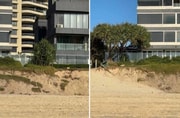Aussie council rules threaten hefty fines, new confiscation rules
By
Gian T
- Replies 40
In a move that has shocked and concerned many Australians, a city council has just voted to introduce some of the toughest measures in the ongoing debate over homelessness in public spaces.
Under the new rules, people sleeping rough in council-managed areas—including parks and public spaces—could face hefty fines and even confiscate their belongings if they refuse to move on when asked.
For years, the Gold Coast has taken a 'welfare-first' approach to homelessness, focusing on support and services rather than punishment.
But that’s all changing. The council has now decided to take a 'compliance-led' strategy, following in the footsteps of Brisbane City and Moreton Bay Councils, which have also recently cracked down on rough sleepers.
What does this mean in practice? If someone is found sleeping rough in a public space, they’ll be given a set timeframe to move on.
Council officers could fine them and take their possessions if they don't comply.
The council did add two amendments before passing the new policy: one to keep working with homelessness services and another to ensure frontline staff are properly trained to deal with vulnerable people.
But for many, these changes don’t go far enough.
The decision comes at a time when Queensland’s housing crisis is worse than ever.
Rents are skyrocketing, affordable housing is in short supply, and support services are stretched to breaking point.
Beau Hayward, founder of the charity Nourish Street, says the situation is dire:
'As local councils move forward with evictions, the situation has become even more dire, with housing services overwhelmed and facing a significant backlog of referrals. For many of those affected, this means facing an uncertain future with very few options available.'
Advocates for the homeless have slammed the new rules as 'cruel' and 'brutal', arguing that fining people who are already struggling to survive is not only ineffective but inhumane.
'Lives are being disrupted, and the dignity and sense of belonging that comes with having a home are being stripped away,' Hayward said.
'It is crucial to remember that, regardless of their circumstances, these individuals are human beings deserving of basic rights, including the right to shelter.'
It’s important to note that the Gold Coast City Council cannot remove people from public spaces forcibly.
But under local laws, they can issue fines—sometimes up to $800—for unauthorised camping and similar breaches.
If someone refuses to move on, their belongings can be confiscated.
Mayor Tom Tate defended the decision, saying, 'We’ll use what’s in our power to get them to move on, and fining is one of those things that we can do.'
When asked if he thought homeless people could actually pay the fines, he admitted, 'I don’t know… their backgrounds.'
The Gold Coast isn’t alone in this approach. Earlier this year, Brisbane and Moreton Bay councils made headlines for clearing out 'tent cities' and introducing similar fines.
These moves have sparked protests and widespread criticism from anti-homelessness advocates, who argue that simply moving people on doesn’t solve the underlying problem—it just shifts it somewhere else.
Many experts and advocates say that what’s needed is more investment in affordable housing and support services, not more fines and crackdowns.
They point to successful programs in other parts of Australia and overseas that focus on 'housing first'—providing stable accommodation as a foundation for people to rebuild their lives.
There are also calls for more compassion and understanding from policymakers.
As Hayward puts it, 'It is crucial to remember that, regardless of their circumstances, these individuals are human beings deserving of basic rights, including the right to shelter.'
If you’re concerned about these new rules, there are ways to get involved.
You can contact your local councillor to share your views, support charities working with the homeless, or volunteer your time to help those in need.
Even small acts of kindness—like donating blankets or toiletries—can make a big difference.
 Do you think councils are doing the right thing by cracking down on rough sleepers, or should they be focusing more on support and services? Have you or someone you know been affected by homelessness or housing insecurity? Share your thoughts and experiences in the comments below.
Do you think councils are doing the right thing by cracking down on rough sleepers, or should they be focusing more on support and services? Have you or someone you know been affected by homelessness or housing insecurity? Share your thoughts and experiences in the comments below.
Under the new rules, people sleeping rough in council-managed areas—including parks and public spaces—could face hefty fines and even confiscate their belongings if they refuse to move on when asked.
For years, the Gold Coast has taken a 'welfare-first' approach to homelessness, focusing on support and services rather than punishment.
But that’s all changing. The council has now decided to take a 'compliance-led' strategy, following in the footsteps of Brisbane City and Moreton Bay Councils, which have also recently cracked down on rough sleepers.
What does this mean in practice? If someone is found sleeping rough in a public space, they’ll be given a set timeframe to move on.
Council officers could fine them and take their possessions if they don't comply.
The council did add two amendments before passing the new policy: one to keep working with homelessness services and another to ensure frontline staff are properly trained to deal with vulnerable people.
But for many, these changes don’t go far enough.
The decision comes at a time when Queensland’s housing crisis is worse than ever.
Rents are skyrocketing, affordable housing is in short supply, and support services are stretched to breaking point.
Beau Hayward, founder of the charity Nourish Street, says the situation is dire:
'As local councils move forward with evictions, the situation has become even more dire, with housing services overwhelmed and facing a significant backlog of referrals. For many of those affected, this means facing an uncertain future with very few options available.'
Advocates for the homeless have slammed the new rules as 'cruel' and 'brutal', arguing that fining people who are already struggling to survive is not only ineffective but inhumane.
'Lives are being disrupted, and the dignity and sense of belonging that comes with having a home are being stripped away,' Hayward said.
It’s important to note that the Gold Coast City Council cannot remove people from public spaces forcibly.
But under local laws, they can issue fines—sometimes up to $800—for unauthorised camping and similar breaches.
If someone refuses to move on, their belongings can be confiscated.
Mayor Tom Tate defended the decision, saying, 'We’ll use what’s in our power to get them to move on, and fining is one of those things that we can do.'
When asked if he thought homeless people could actually pay the fines, he admitted, 'I don’t know… their backgrounds.'
These moves have sparked protests and widespread criticism from anti-homelessness advocates, who argue that simply moving people on doesn’t solve the underlying problem—it just shifts it somewhere else.
Many experts and advocates say that what’s needed is more investment in affordable housing and support services, not more fines and crackdowns.
They point to successful programs in other parts of Australia and overseas that focus on 'housing first'—providing stable accommodation as a foundation for people to rebuild their lives.
There are also calls for more compassion and understanding from policymakers.
As Hayward puts it, 'It is crucial to remember that, regardless of their circumstances, these individuals are human beings deserving of basic rights, including the right to shelter.'
You can contact your local councillor to share your views, support charities working with the homeless, or volunteer your time to help those in need.
Even small acts of kindness—like donating blankets or toiletries—can make a big difference.
Key Takeaways
- Gold Coast City Council has shifted from a welfare-first to a compliance-led approach to homelessness in public spaces, meaning rough sleepers could now face fines and have their belongings confiscated if they refuse to move on.
- The new policy applies to council-managed areas, such as parks, and includes fines and compliance notices for unauthorised camping, with amended provisions for continued collaboration with homelessness services and frontline staff training.
- The decision has been criticised by anti-homelessness advocates and frontline service providers, who argue that the policy lacks compassion and does not address the underlying causes of homelessness, especially amid an ongoing housing crisis.
- Mayor Tom Tate admitted the issue is complex but defended the Council’s actions, stating that issuing fines is one of the few tools available under local laws, though the Council does not have the power to physically move people on.








